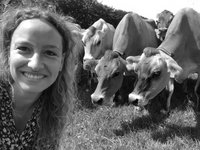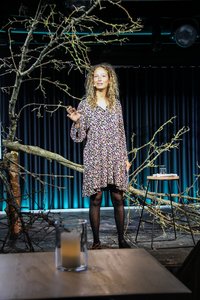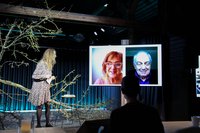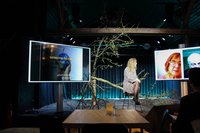Session 3 - THE TASTING
Our taste preferences are to a higher and higher degree related to the surrounding society, the climate debate and to questions of morality. To take care of our planet and future we also need to think of each other. In this session we look at taste in a broader perspective. The discussion points to the societal issues with topics as: health, change of diets, food culture, lifestyles, taste and sustainability. In this session about "The tasting" the main question was: How will taste practices, cultures and lifestyles develop in the context of the Anthropocene?
Dr. Cristina Tirado (participating virtually) and Professor émérite Claude Fischler (participating virtually) joined session 3 from afar, and Laura Hoffmann, project manager at Thinktank Frej, was present on stage at Maltfabrikken to mediate the conversation on "The tasting".
In the video, you can watch session 3, full lenght, including an introduction by Paul Tyler. Enjoy!
Laura Have Hoffmann

Laura Have Hoffmann is project manager and volunteer coordinator at The Think Tank Frej. Frej is an agriculture-political think tank that strives for and works towards a more sustainable danish agriculture and food-industry. Laura motivates and coordinates the organization’s around 100 volunteers and furthermore she plans and executes a broad variety of projects and workshops. In her former job Laura worked at The Danish Ministry for Climate, Energy and Utilities where she participated in the making of the new Danish Climate Law, the new official dietary advice that takes climate into consideration, a new green strategy for public procurement, and she was project lead for The Danish Youth Climate Council. Laura has a degree in political science, and she is very interested in climate, sustainable food-industry and behavior.
Cristina Tirado

Dr. Cristina Tirado is a professor at the Environmental Sciences Program at the Collage for Science and Engineering and Director of International Programs at the Center for Urban Resilience at Loyola Marymount University. She works at the interface between science and policy related to climate change, health, food and sustainable development with the University, WHO, FAO, UNEP, governments, and NGOs worldwide. She has served as WHO Food Regional Adviser in Europe (53 countries) and in Latin America (45 countries), as Coordinator of the WHO Food-borne Surveillance Program at the Federal Institute for Risk Assessment in Berlin and Director of the PHI's Center for Climate Change and Health in Oakland California. Currently she serves as policy adviser for several UN organizations, she moderates the UN Standing Committee of Nutrition group on Climate Change and Nutrition and serves in the Secretariat of the Mediterranean Cities for Climate Change Consortium (MC-4).
Cristina has been mainstreaming health, nutrition and gender issues around the UNFCCC work, she has been a key partnerships' driver at Rio+20, she contributed through the Women Major Group to the HL consultations for the SDGs and 2030 agenda and currently to the High-level Political Forum on Sustainable development. Cristina has been contributing author of the health chapter of the Intergovernmental Panel on Climate Change’s (IPCC) AR4, she has been nominated lead author of the IPCC AR6 health chapter to be published in 2021 and she has authored numerous research and policy publications and books. She is a DVM, with MS/PhD degrees in Environmental Sciences from Cornell University.
Claude Fischler

Claude Fischler is head of research émérite at the French National Center for Research (CNRS). He is a sociologist and anthropologist with a central research interest in food habits and nutrition. His early work was on beliefs, rumors and urban legends. After several years in urban anthropology / sociology, he became one of the first social scientists looking at food as a major interdisciplinary research topic: food cultures, food habits and eating patterns, beliefs, "scares" and crises, changes in consumption, health and sustainability issues and policies. Fischler has special experience in international, cross-cultural comparative approaches, both qualitative and quantitative. Recently, his favorite topic has been commensality: the sharing of food, the social dimension of meals, how social interactions determine or modify how we eat, what we eat and how much we eat.


